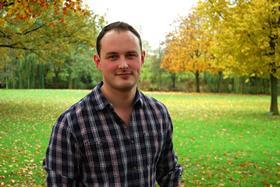
A postgraduate research student is hoping that his passion for plant science will help growers find a solution for their Potato Cyst Nematode (PCN) pest problem.
Bill Wattsis investigating strategies for optimising biofumigation - a novel pest management technique that will support existing control methods following legislative changes to European Union (EU) pesticide registration.
Biofumigation is the term used for growing glucosinolate-rich cover crops such as Indian Mustard (Brassica juncea) or Oil Radish (Raphanus sativus), that are chopped and incorporated into pest or disease-infested soils. Glucosinolates are non-toxic products produced during plant metabolism.
The process involves the breakdown of these glucosinolates into toxic gases through a natural process of hydrolysis; a chemical reaction that occurs in the presence of water.
This is proving to be a promising pest and disease management strategy which could reduce pesticide usage, and has been shown to be highly effective in past studies.
Watts, from Ludlow, first became interested in the subject five years ago during his undergraduate degree at Harper Adams University.
His passion continued through his bachelor's degree in agriculture, where he conducted several experiments in both the glasshouse and field.
This was followed by a master's degree in integrated pest and disease management, specialising in biofumigation of PCN.
The 23-year-old, who has since dedicated his PhD to the topic, said: 'I became interested in biofumigation during my first year at Harper Adams, after a lecture withDr Ivan Grove
'I found the prospect of harnessing the natural defence mechanism of plants to the advantage of agriculture, to be fascinating.I then spent my placement year working with a potato agronomist whom fortunately shared my interest and enthusiasm for the subject. We dedicated time to locating and investigating diverse biofumigant species for efficacy against PCN, several of which we still work with.
'Post-placement, I formed a successful partnership with Dr Matt Back, a specialist in biofumigation at Harper Adams. For the past three years Dr Back has worked with me to develop ideas and experiments to test the effectiveness of biofumigation against PCN.
'He is now the Director of Studies for my PhD, along with Dr Grove andDr Paul Hand, a specialist in plant breeding. We have three exciting years to expand upon this topic area.'
Watts will be focusing specifically on improving the incorporation methods used in biofumigation and assessing the most suitable conditions needed to optimise the process. He also hopes to identify the most appropriate machinery for use with biofumigation, and the most effective species or blends.
Watts added: 'Biofumigant plants have the potential to be as effective as chemical crop protection methods, if we can unlock the potential within the plants.
'The team wants to find out how to optimise the release of the toxic compounds from biofumigants, and how to keep them in the soil where they are useful.
'Whilst the prospect of losing pesticides is daunting for industry, the prospect of developing pest management strategies such as biofumigation to meet demands, represents an exciting opportunity for researchers such as myself to deliver much needed answers.'
As part of the research, which is sponsored by Frontier Agriculture Ltd, Watts is conducting laboratory, glasshouse and field experiments.
He hopes to work towards becoming a research agronomist specialising in the management of cyst nematodes and is determined that his research will deliver a series of practical steps to achieving effective management of PCN on farm.



